HOME
It's been said: “A man travels the world over in search of what he needs and returns home to find it”.
During the weeks of lockdown that return home became practically permanent: we suddenly found out that, the following day, we would no longer be able to leave the house, and we didn't know with any certainty how long this situation would last.
Just like that, the walls of our home suddenly became the confines of our new world: from that moment on we were forced to find everything we needed there, between the living room and the kitchen, the bathroom and the bedroom, with terraces or gardens as privileges for the lucky ones.
In these circumstances the house showed its true nature, as the architect Le Corbusier put it, as “a machine for living in”. With the versatility of a machine – the components of which can be disassembled and reassembled for new uses – the house became a workplace, gym, classroom, cinema, theatre or concert hall, Kinderheim.
But not for everyone. Because although some described Covid-19 as a “social leveller” and a “democratic virus”, for the more vulnerable members of society, home remained the prison that it had always been – a place of degradation, of forced proximity, in some cases of exclusion – and the suffering was further exacerbated by not being able to grab an hour of respite.
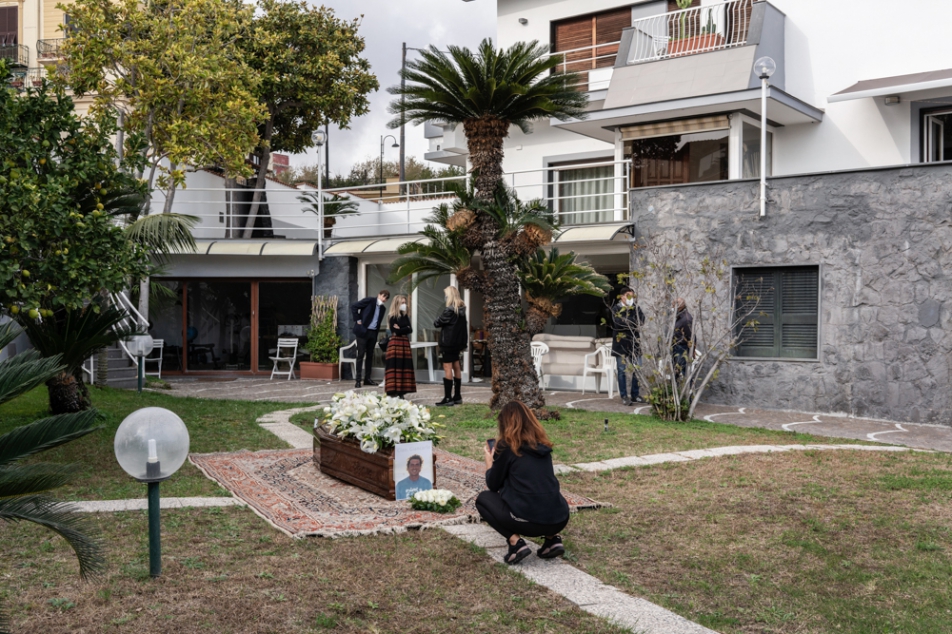
Naples, 12 November 2020. A funeral held in the garden of a private house. Due to the pandemic and the consequent limitations in performing the ceremony, people recorded videos to share with those who could not attend the funeral.
Urban allotments, Livorno, Tuscany.
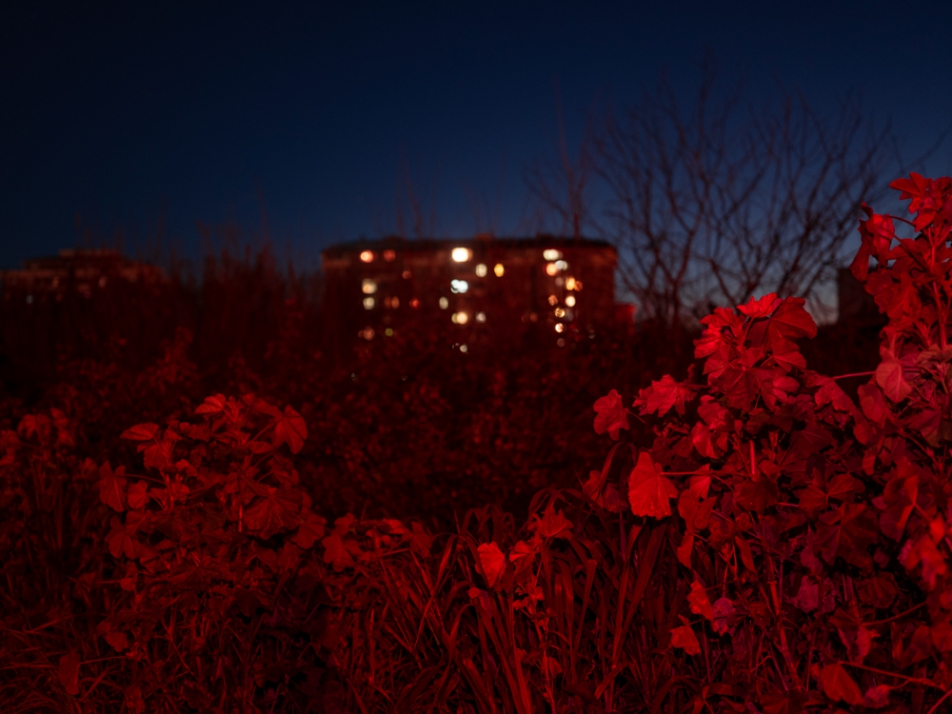
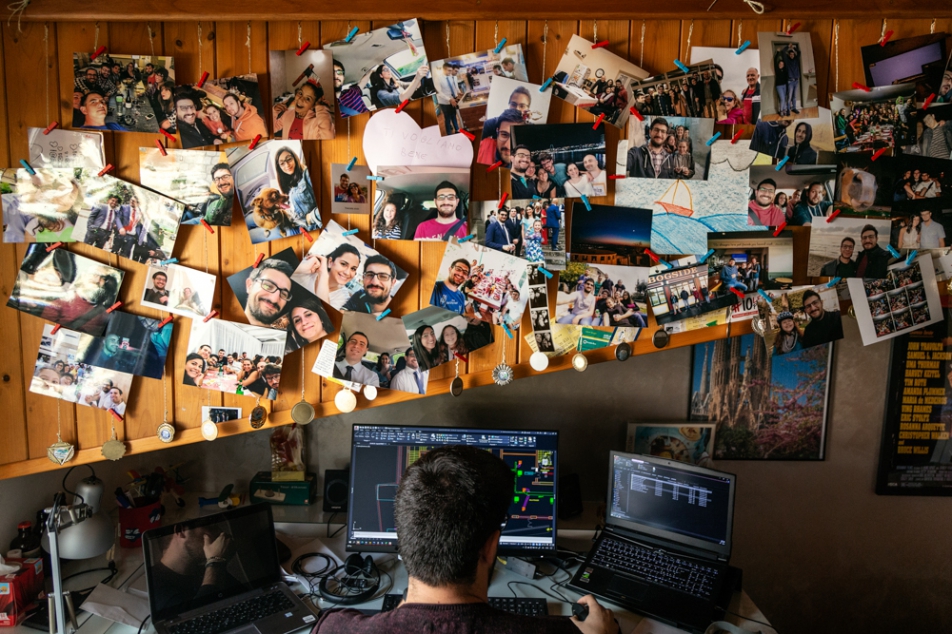
Vincenzo, aged 28, at work in his room. At the beginning of the epidemic and the publication of the lockdown legislation on March 9, Vincenzo was already back in his hometown of San Prisco, in Campania. After an interview during quarantine, at the beginning of May, he started working remotely for the Milanese office of an international engineering firm, where he designs mechanical systems. The company currently allows him to work remotely from his hometown prior to a possible move north.
Cervia, Emilia-Romagna, April 2020.
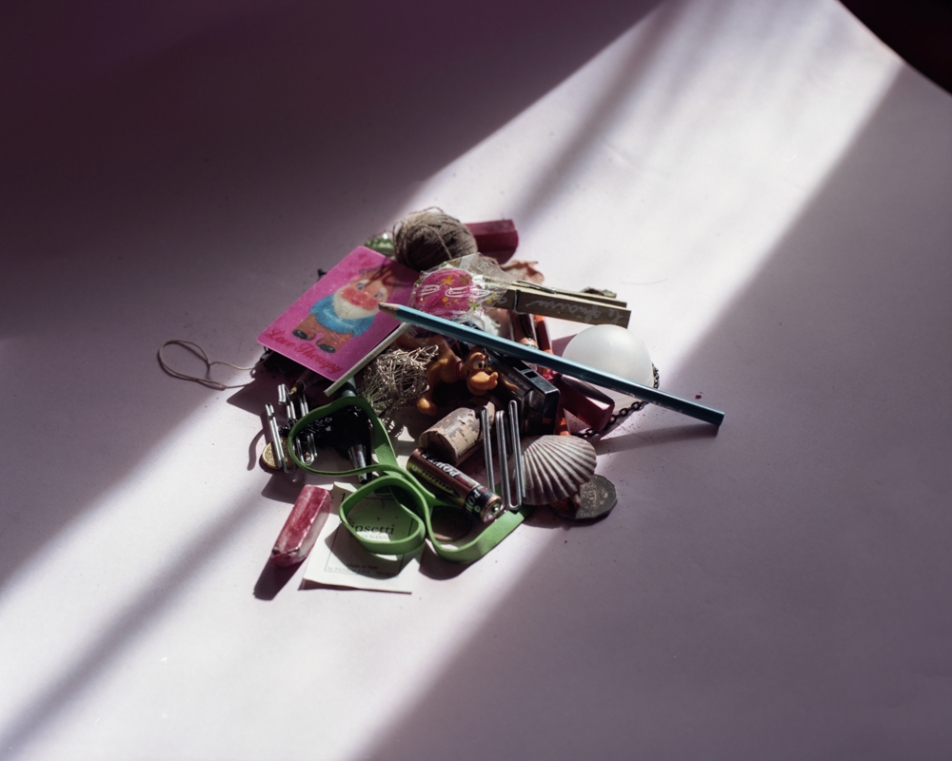
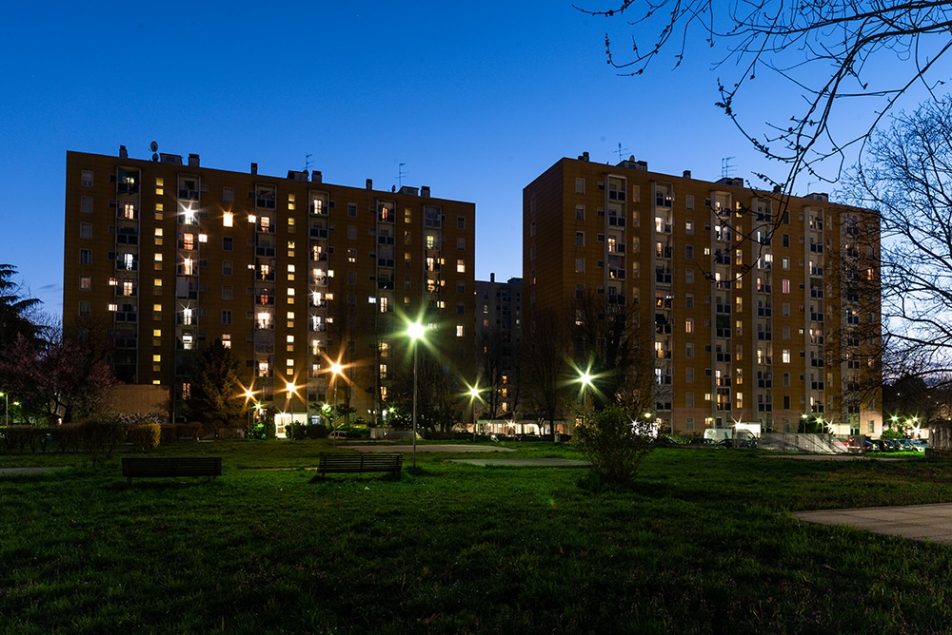
Milan, Via dei Missaglia. People are obliged to stay at home on account of the Covid restrictions. The bright lights in houses contrast with the emptiness of the streets.
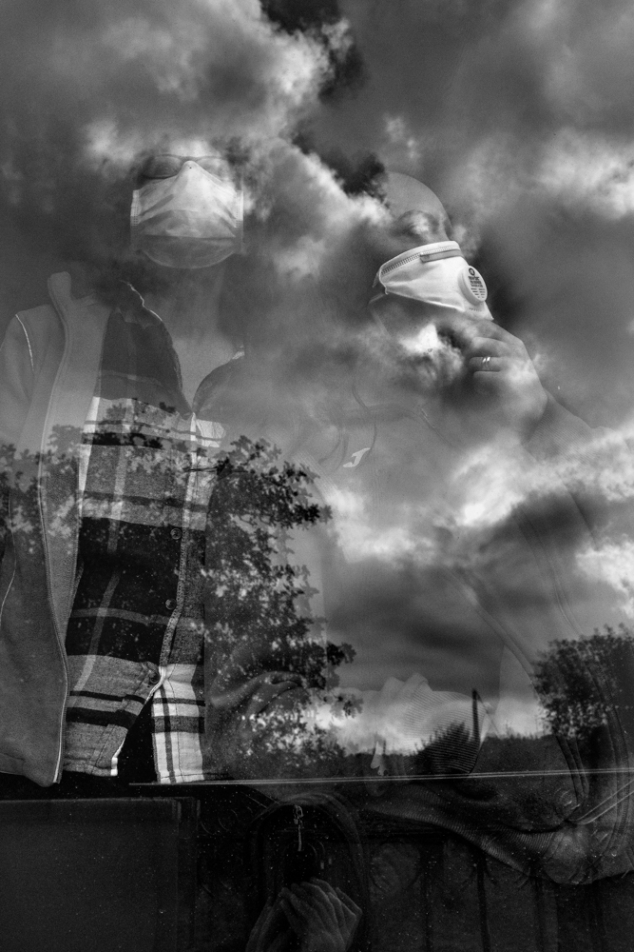
San Cataldo, Sicily, April 2020. Two women at the window look at the clouds on a spring day.
Milan. Rider Laura Morelli rings a bell while delivering products for a delivery company.
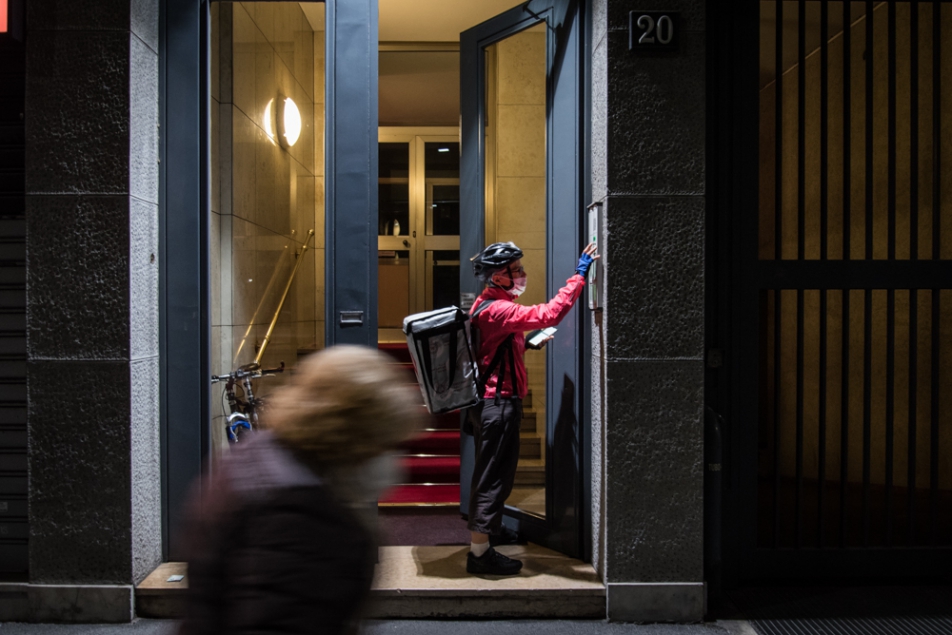
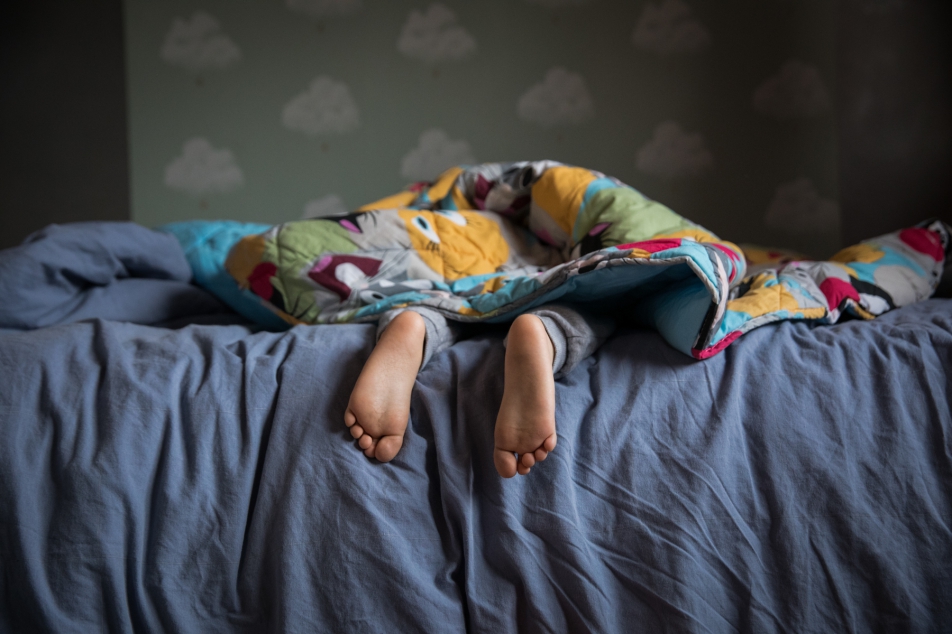
Niccolò, who’s obliged to spend lockdown with his parents at their home near Latina, in one of the moments of discomfort due to the many small daily habits he has to do without.
Giorgia, 23, a fashion copywriter, and Marco, 25, a web designer. During the lockdown they have found a new harmony, thanks to a sense of suspended time.
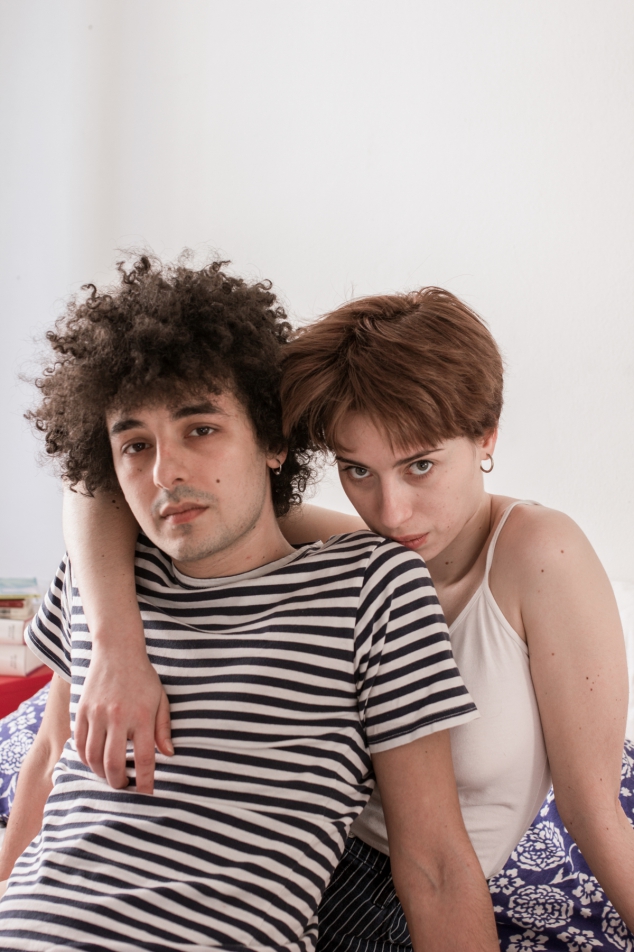
Paola Mirra is seven months pregnant and is expecting a baby girl, Bianca. Together with her partner Andrea Calicchio, she chooses a work of art to hang from the wall of their apartment in Milan.
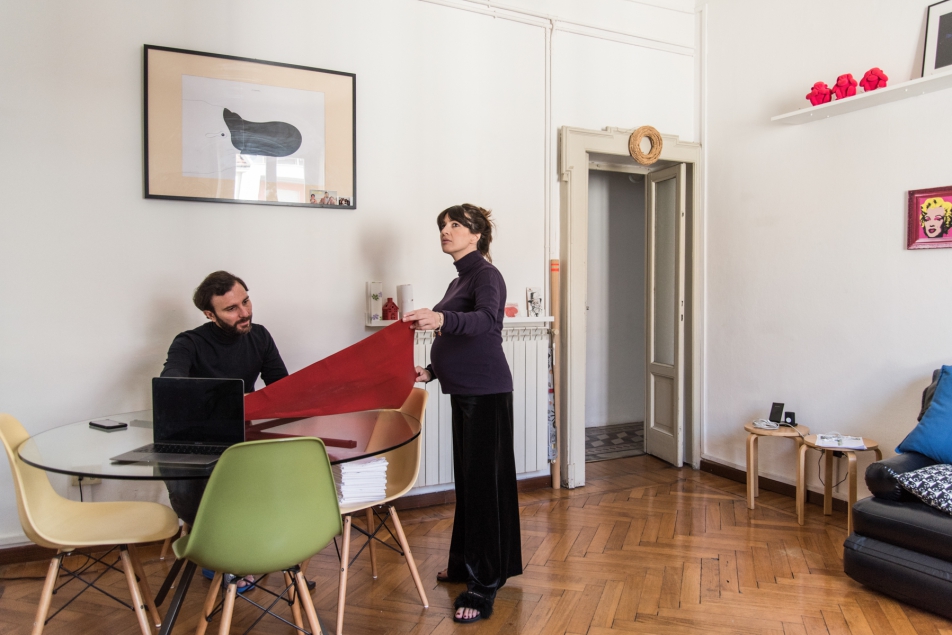
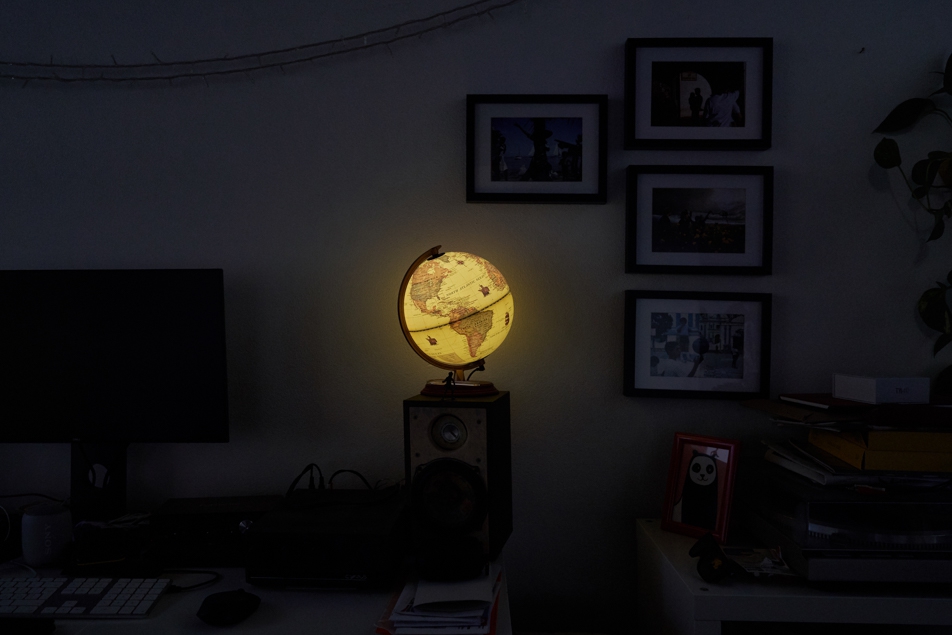
Danilo, 31, a photographer, saw a drastic reduction in work as a result of the lockdown. During the weeks of isolation at home in Bologna, he gazed longingly at the globe, in the hope of being able to travel again soon.
San Cipriano Picentino (near Salerno). Teresa Tastardi is a young single mother, with two girls, aged 8 and 11. She works as a shop assistant in a supermarket and, in order to guarantee her daughters’ safety, she sent them to live with their grandmother. She now spends a lot of time in the children's bedroom.
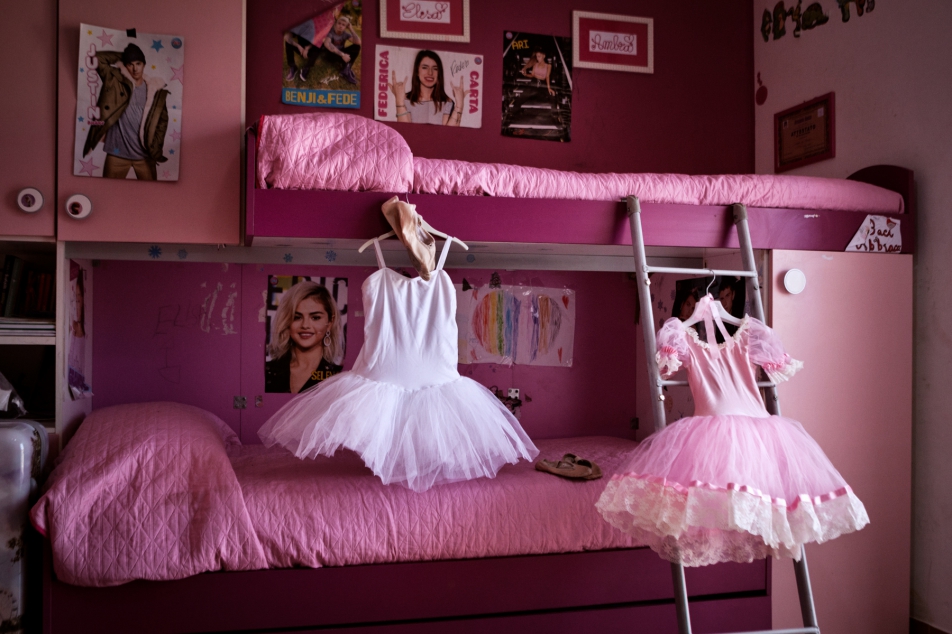
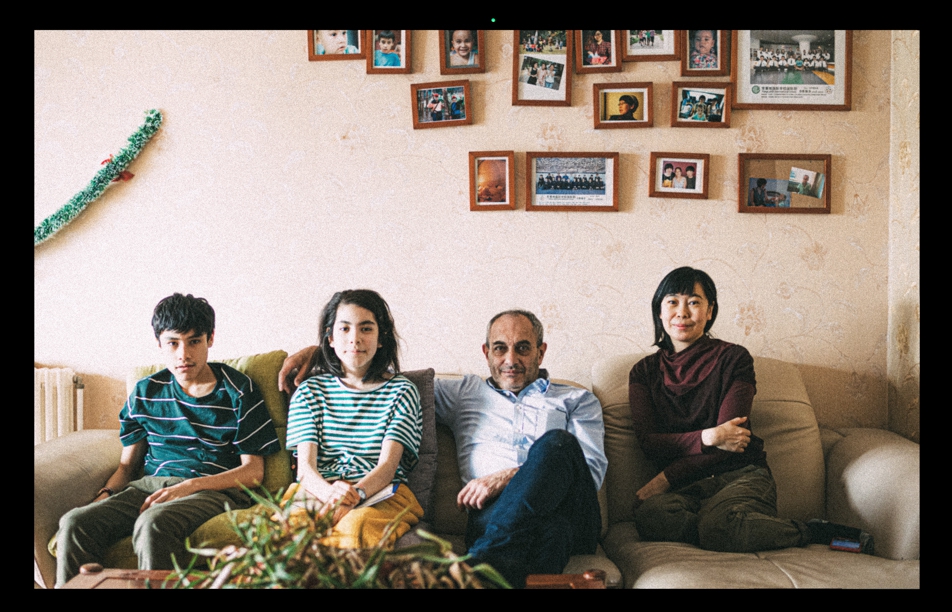
Beijing (China). Andrea, 60, is a film-maker and photographer who's lived in China for 40 years. Here he's with his partner Jin Xiaobei, a 50-year-old housewife, and their children Giulio, 14, and Lia, 12. Andrea: “One thing that shocked me about Italy during the lockdown was the fines. There were no fines in China, there aren't even any police officers going around carrying out checks. The entire population is committed and is able to maintain its self-discipline”.
Milan, Piazza Zavattari. People are obliged to stay at home on account of the Covid restrictions. The bright lights in houses contrast with the emptiness of the streets.
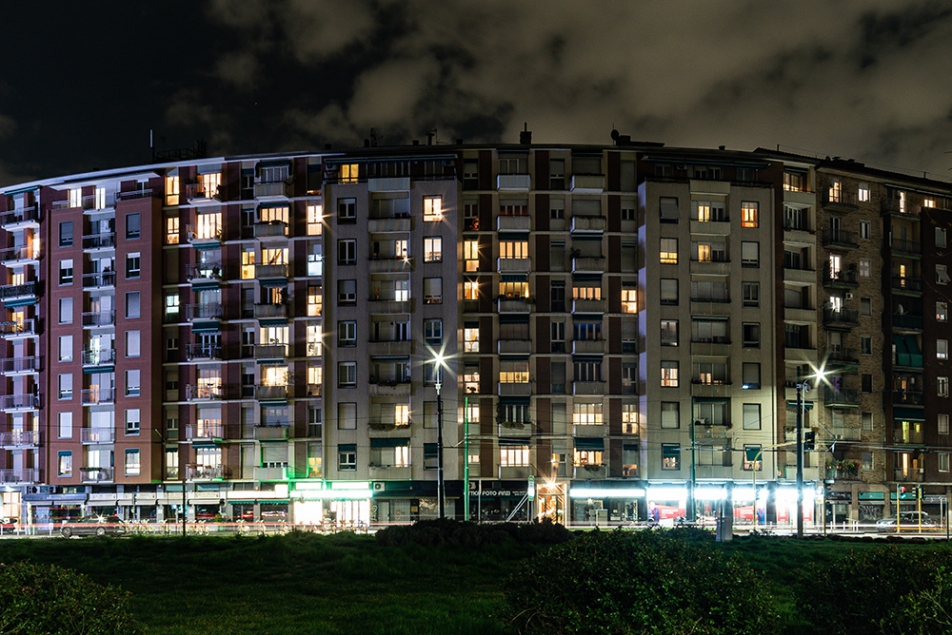
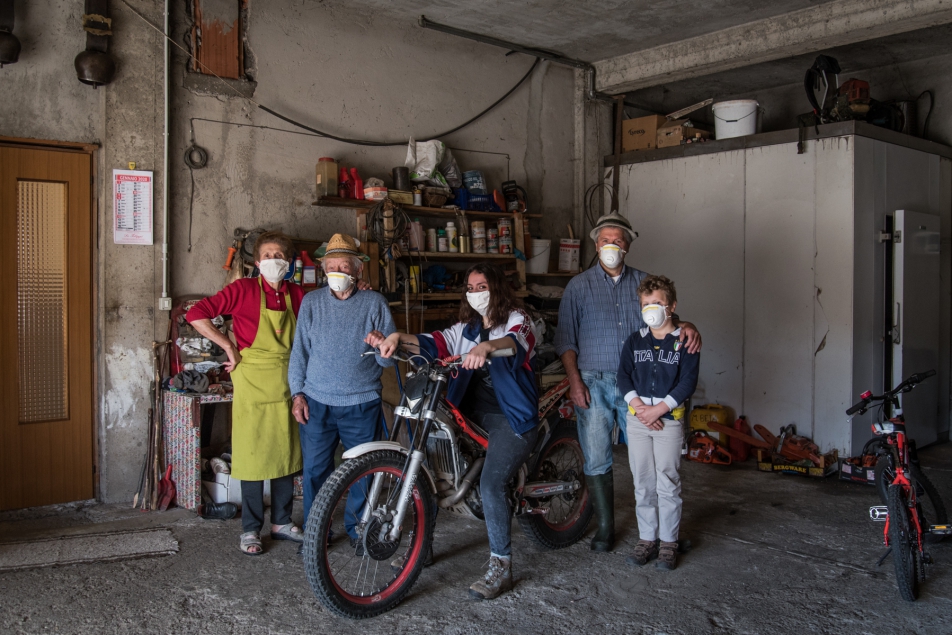
Blello, near Bergamo, is one of the so-called “zero Covid” villages, where not a single case of infection has been recorded. Here the Locatelli family run a dairy farm that produces cheese. From left to right: Caterina (aged 77) with husband Carlo (84), their granddaughter Daniela (18), son Giorgio (52) and grandson Claudio (8).
Milan, contract teacher Noemi Ventura has been unable to work or earn a salary since the beginning of the lockdown and the closure of the schools. Noemi lives with another contract teacher, Elsa Radaelli, in an apartment provided by the Fondazione Progetto Arca, which also supplies them with food parcels.
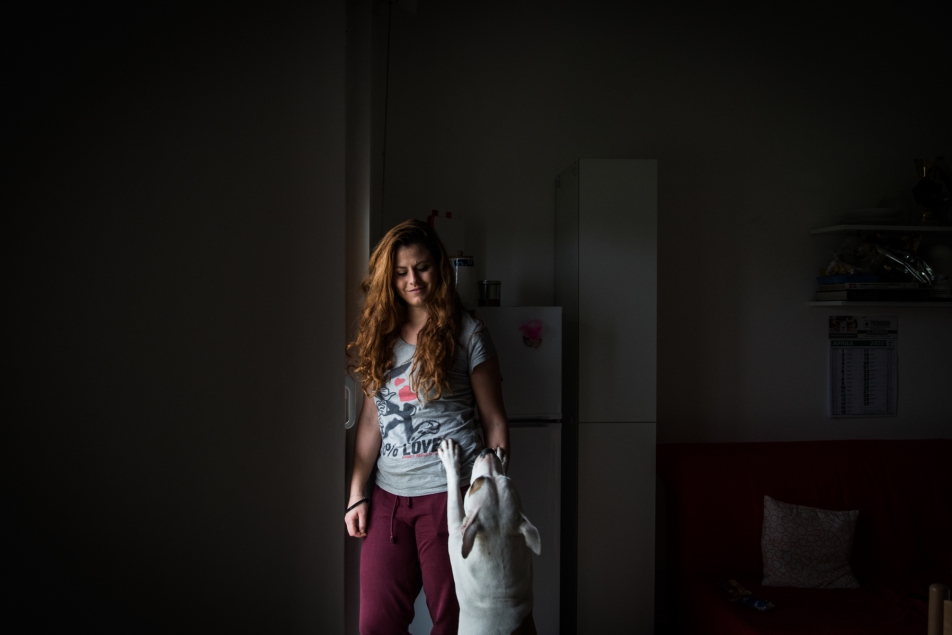
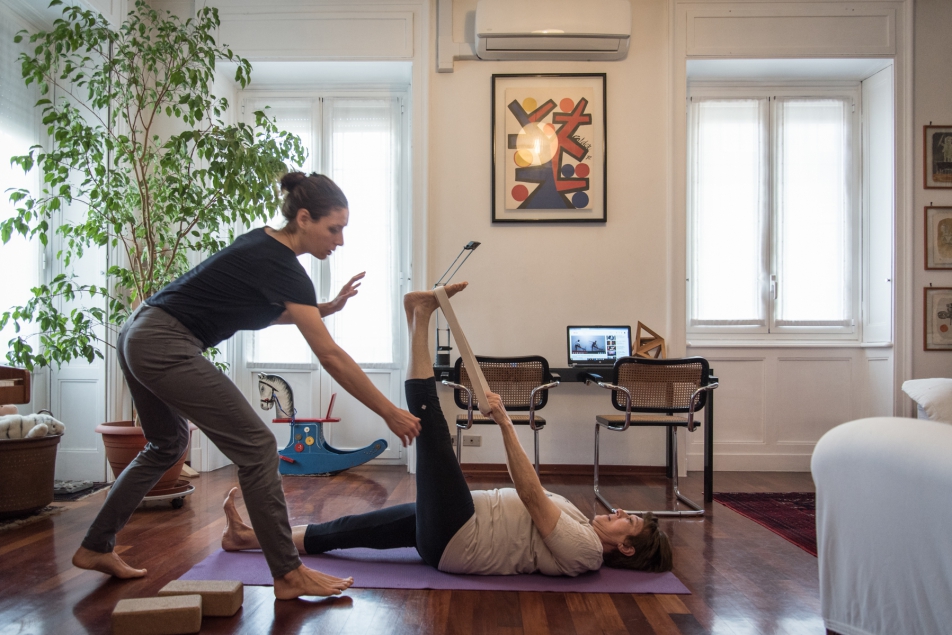
Fiore Doni, a retired German teacher, does yoga with her daughter Karin Freschi, a Yoga teacher at the Ganga Yoga School in Milan.
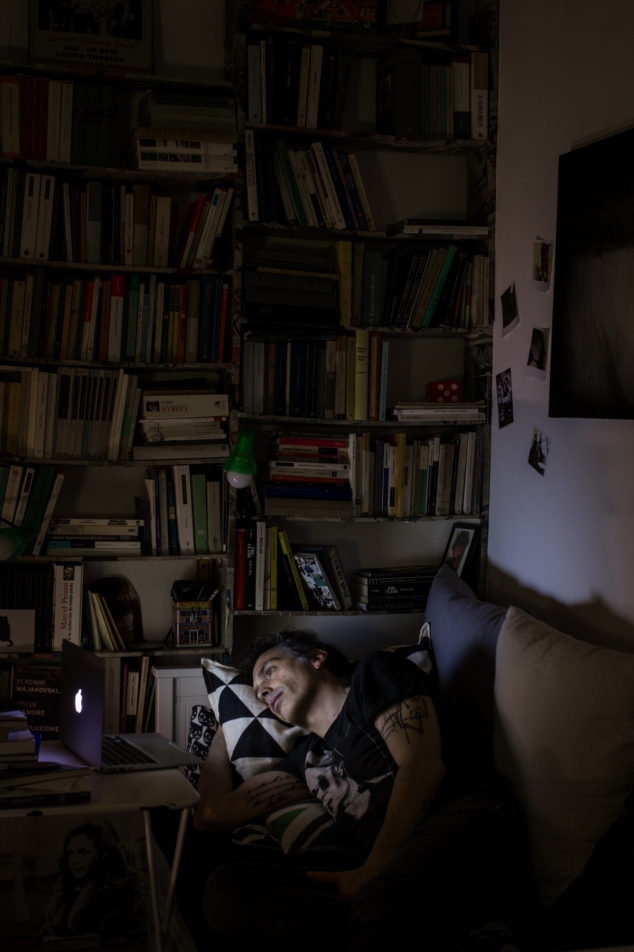
Valeria, 29, works in Versailles, while Fabio, 42, works in Bologna. They decided to leave Skype on day and night, even without talking but only to feel close to each other, to feel the other’s presence, in spite of the absence: reading their own books in silence, or else having dinner together.
Harpist and composer Vincenzo Zitello has used this period in which all of his concerts have been cancelled to complete a recording on the theme of a “Medieval Bestiary” creating sound portraits. The work, which spans world, classical and ancient music, had been on hold for a long time due to concert commitments.
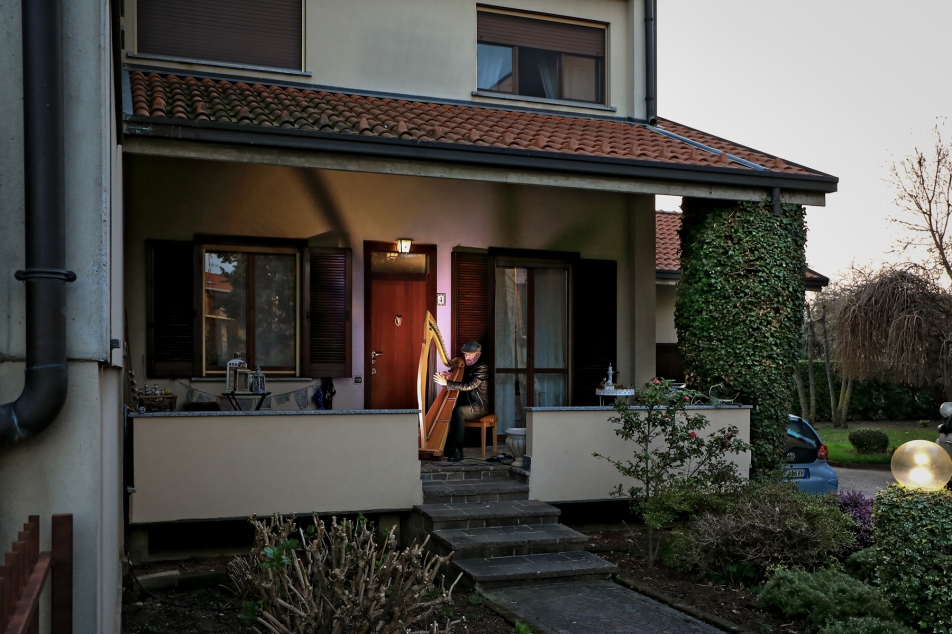
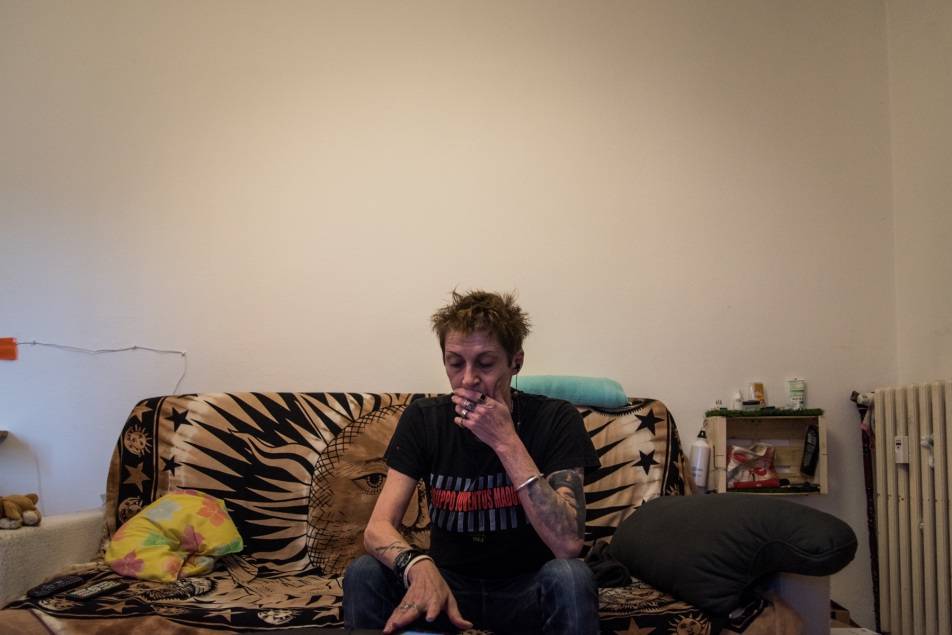
Milan, contract teacher Elsa Radaelli has been unable to work or earn a salary since the beginning of the lockdown and the closure of the schools. Elsa lives with another contract teacher, Noemi Ventura, in an apartment provided by the Fondazione Progetto Arca, which also supplies them with food parcels.
Elia Rollier is a videomaker and the creator of the Cinevan project that projects films in Italy’s town squares and the courtyards of apartment buildings. To celebrate 25 April, Italy’s Liberation Day, seeing as it was impossible to hold outdoor gatherings, Elia organised a group of people to show a series of projections from the windows of their homes onto the façades of buildings opposite.
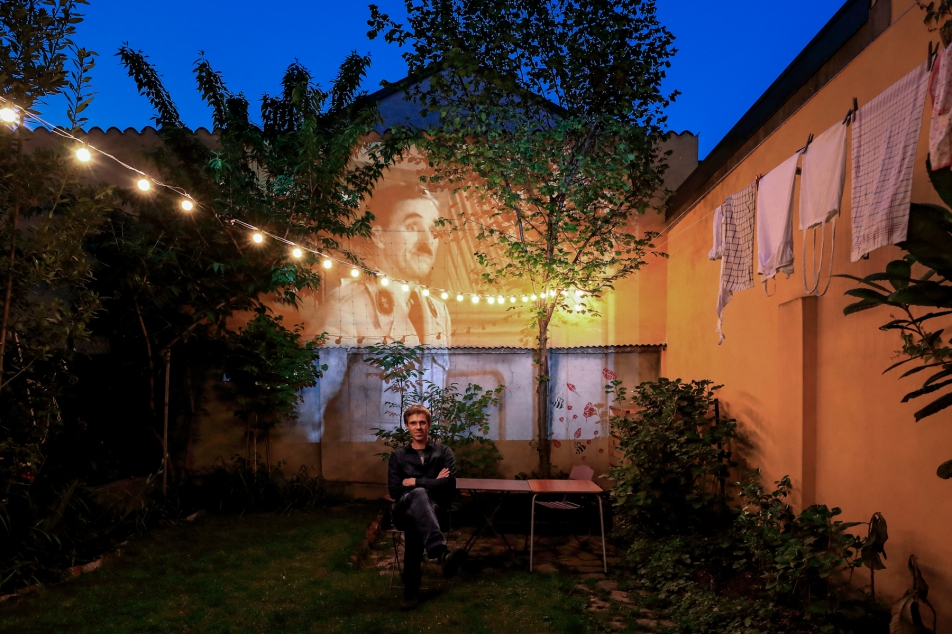
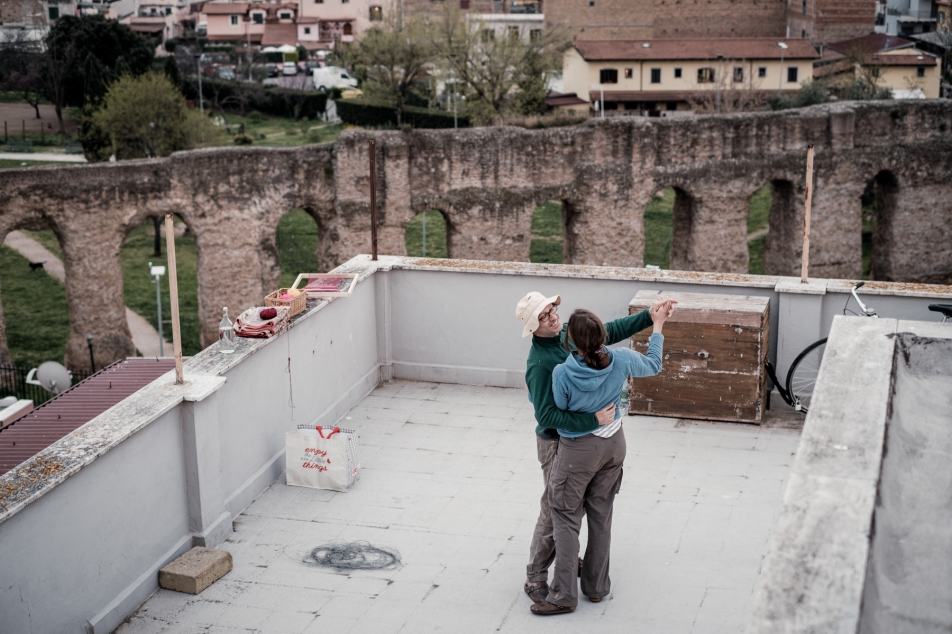
Rome, Torpignattara. A couple dancing on an apartment building terrace. In the background we can see the Alexandrian Aqueduct.
Milan, the Falcone family lives in council housing and subsists on the redundancy payments received by Daniele, a manual worker. His wife Maria Paola doesn’t work. Marika is a law student and Marco (on the bed) worked as an electrician at Linate airport but his contract wasn’t renewed. For this reason they regularly receive food parcels from Caritas.
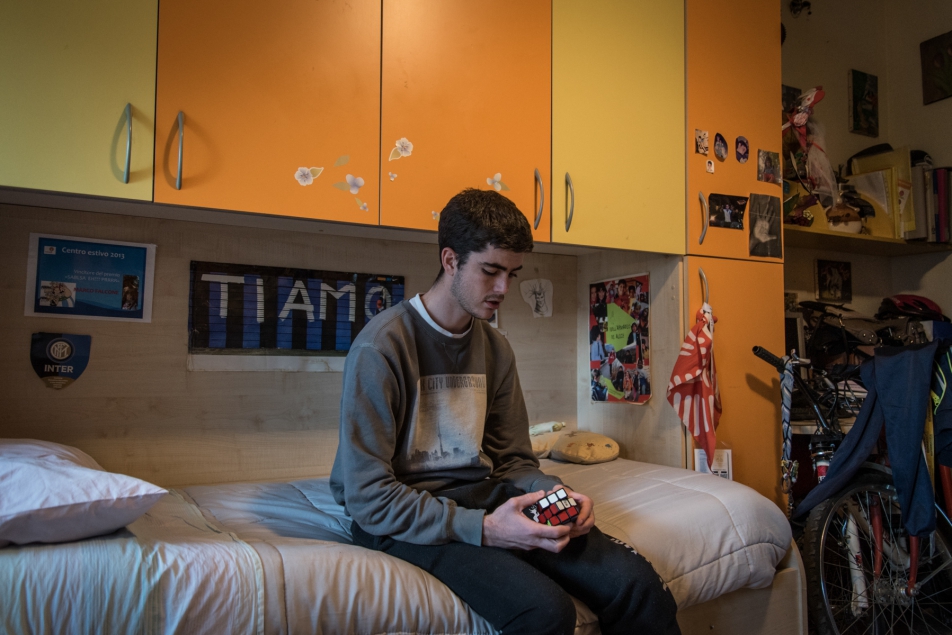
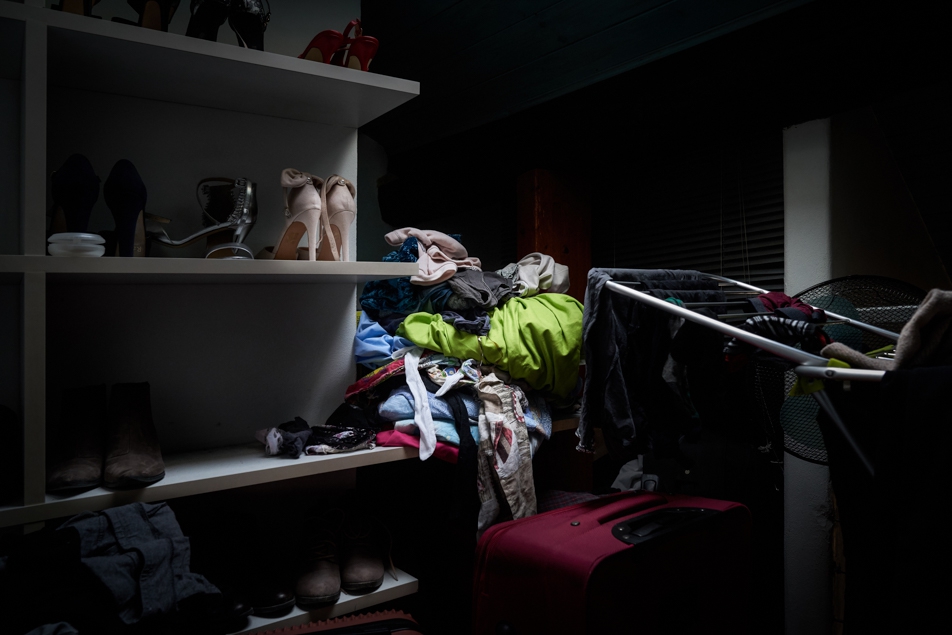
Bologna, April 2020. Danilo, 31, a photographer, and Claudia, 32, a PA to a CEO, have been confined to their home during lockdown. They have thrown their clothes into the corner of their flat: the vibrant colours refer to the days they've had to forego.
Milan, Paolo De Amicis, a sales representative for Vodafone, works from his sofa at home. Next to him is his daughter Giuditta, 22, who studies chemistry at the city’s Statale University.
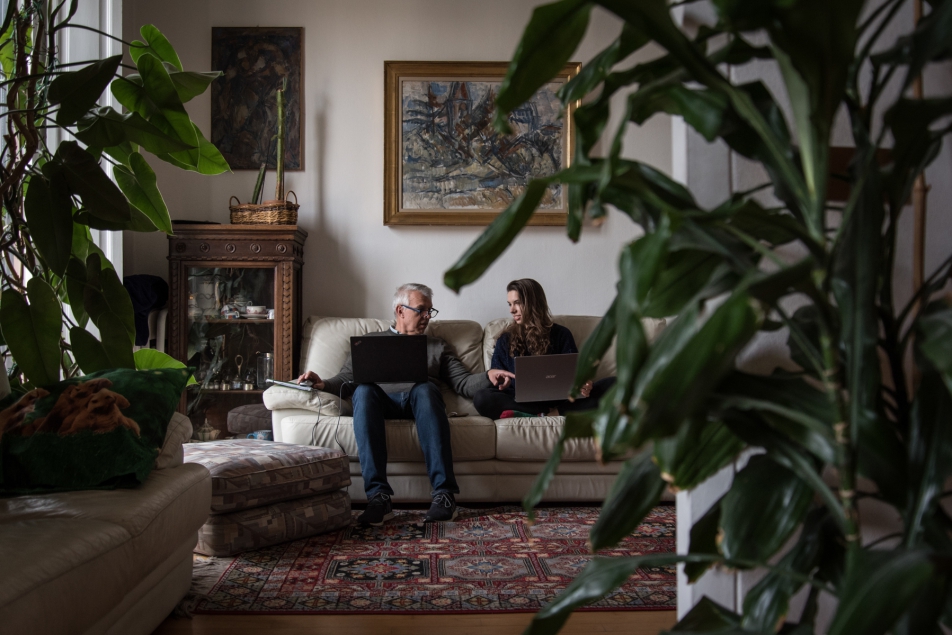
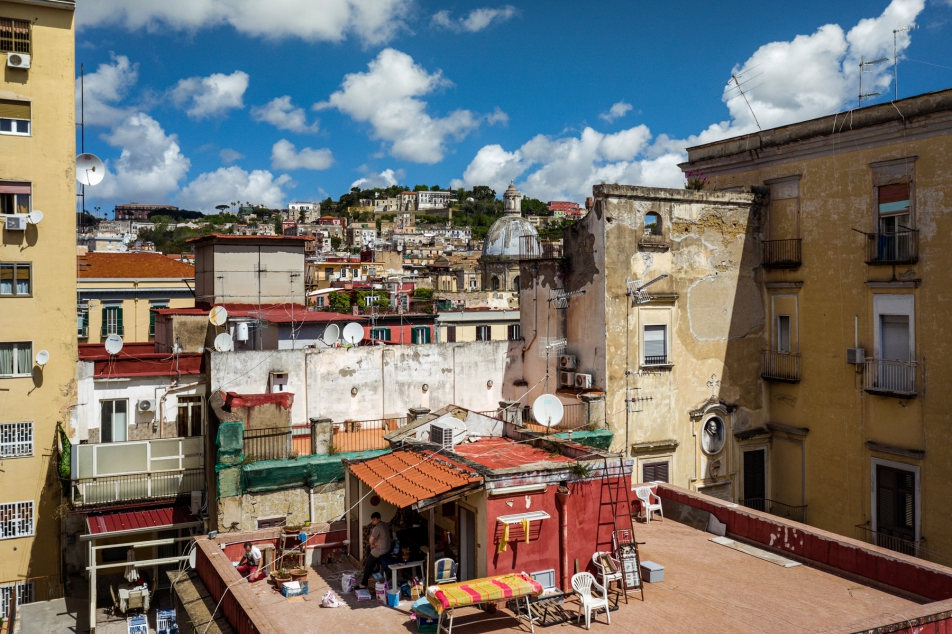
Naples, Porta San Gennaro neighbourhood. People in Naples are self-isolating at home in order to fight the Covid-19 pandemic. Lots of citizens go up to the apartment buildings’ terraces looking for an outdoor space. A father and son prepare the terrace of their apartment, knowing that they will be spending the summer in the city.
Milan. Anita D'Amanzo and her daughter Maddalena with the computer that they had to buy so that Maddalena could follow her school lessons online. Anita doesn’t work and suffers from multiple sclerosis. Her husband, Alessandro D’Amanzo, has had arthrogryposis since birth and receives disability benefits. The family needs extra support, however, and receives food parcels from the Caritas charity organisation.
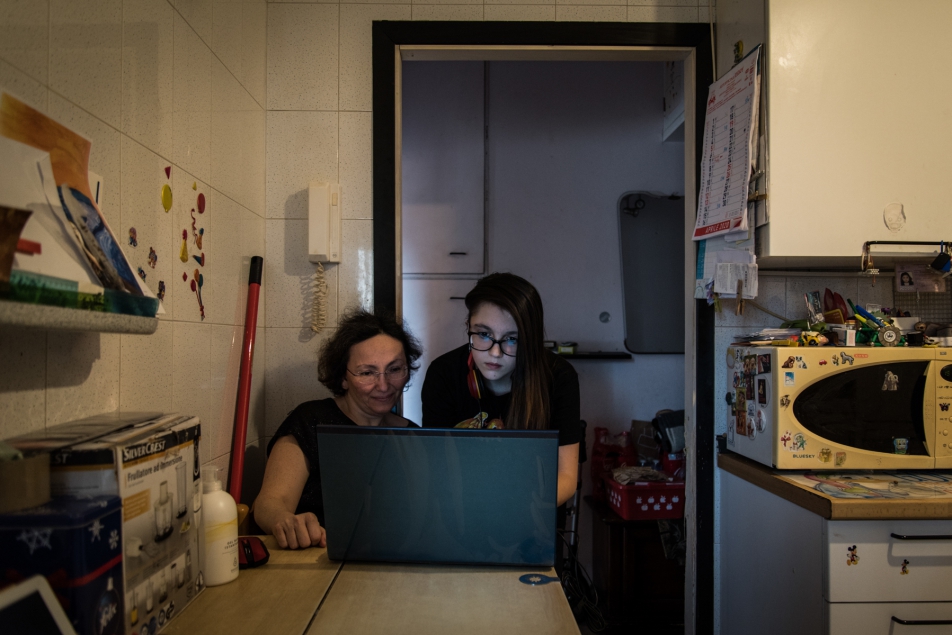
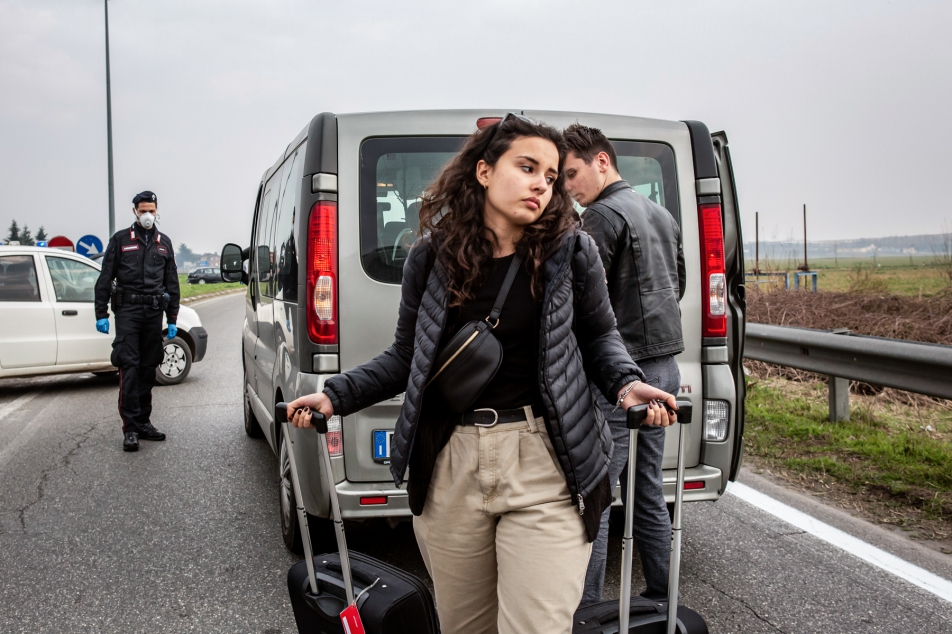
In Casalpusterlengo, in Lombardy, a checkpoint manned by carabinieri prevents people from going into the so-called “red zone”, just days after the first Italian Covid-19 patient was detected in the area.
Irma, near Brescia, is one of the so-called “zero Covid” villages, where not a single case of infection has been recorded. Three local men pose in front of an old house in the town centre. From the bottom: Oscar Zeni, Tiziano Calcari and his son Paolo.
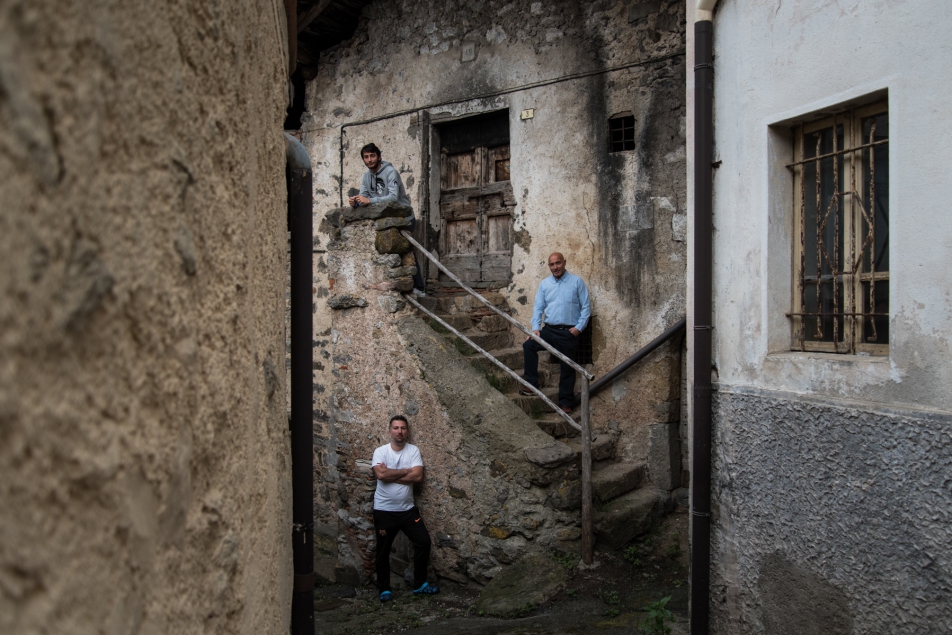
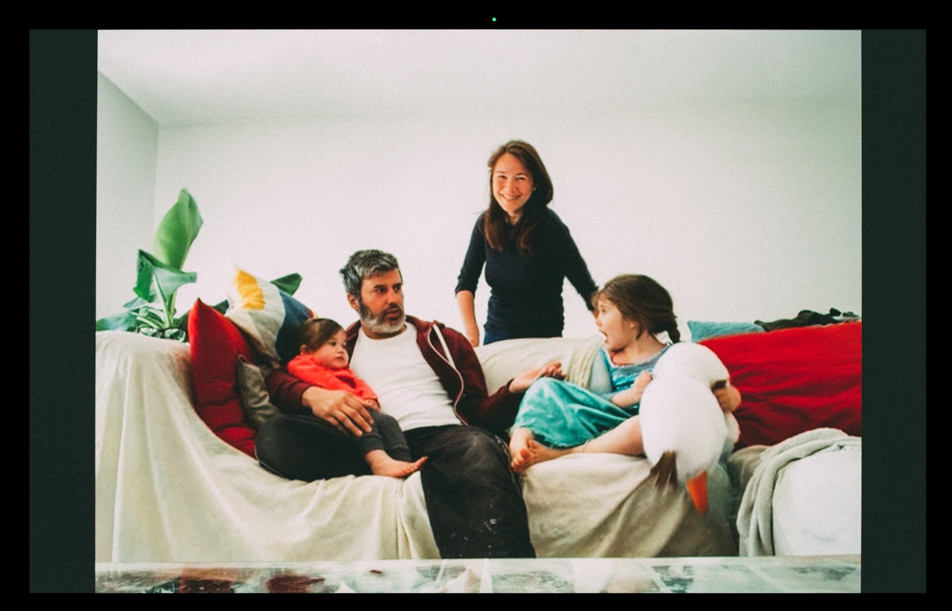
Pradalunga (Bergamo). Omar, 42, a film director and Silvia, 35, a special educational needs teacher, with their children Claudia, 4, and Daria, 2. Omar: “Here, all you can hear are ambulances and church bells ringing in mourning. The house has become an impromptu kindergarten, but at least it distracts us from the pandemic, because we're so busy that we don't get chance to talk about it until we've put the kids to bed in the evening”.
Milan, Valentina Mutti, a consultant, does yoga at home, following online lessons provided by her school, the Ganga Yoga.
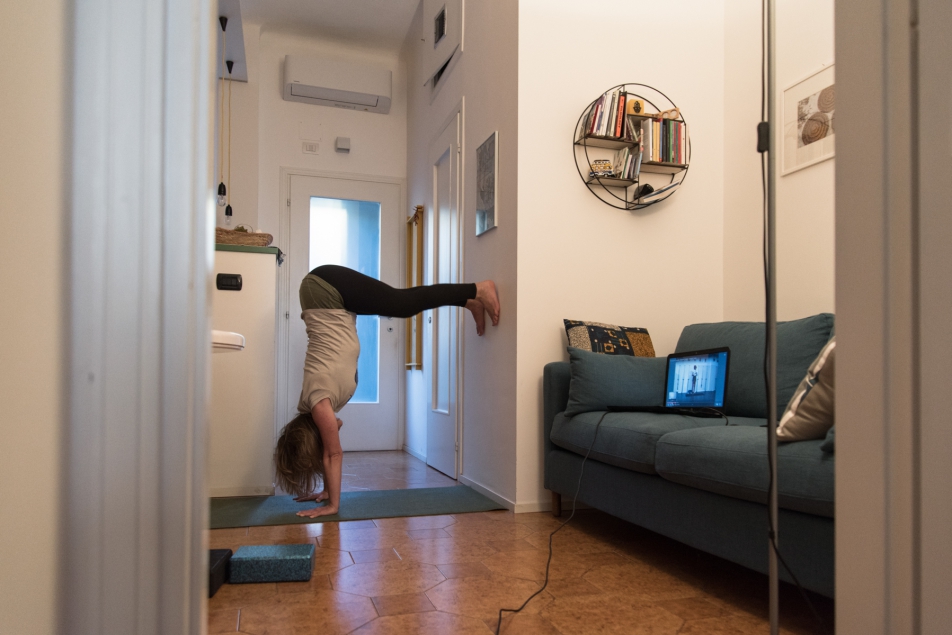
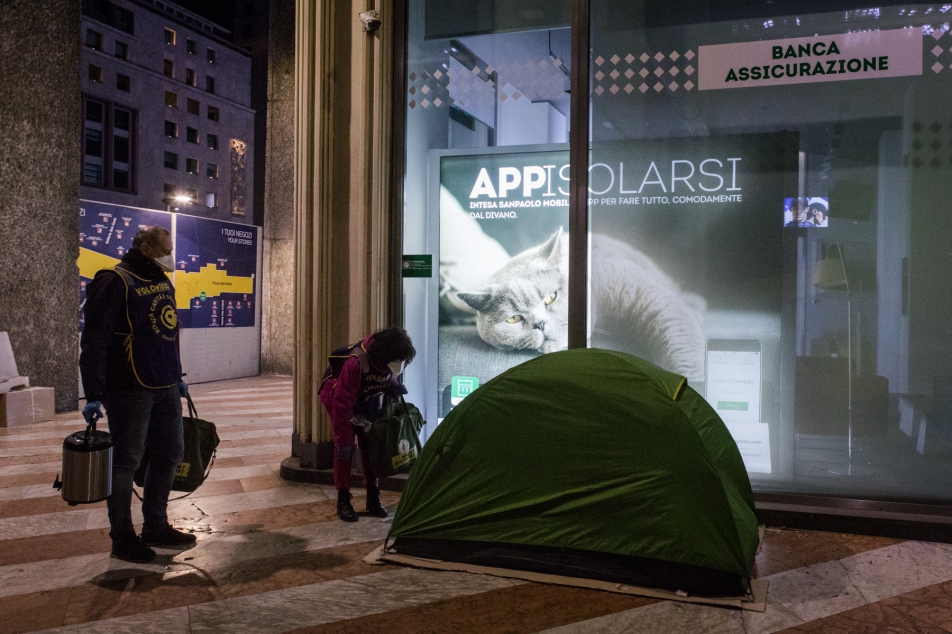
Milan, Fulvia and Aldo, two volunteers from the charity Ronda della Carità e Solidarietà with a homeless person who lives in a tent in Piazza San Babila.
Milan. Vevek Zingali studies with an iPad under the gaze of his dad Alessio: in the time of the Coronavirus, the primary school sends homework via email, which is then downloaded onto an iPad.
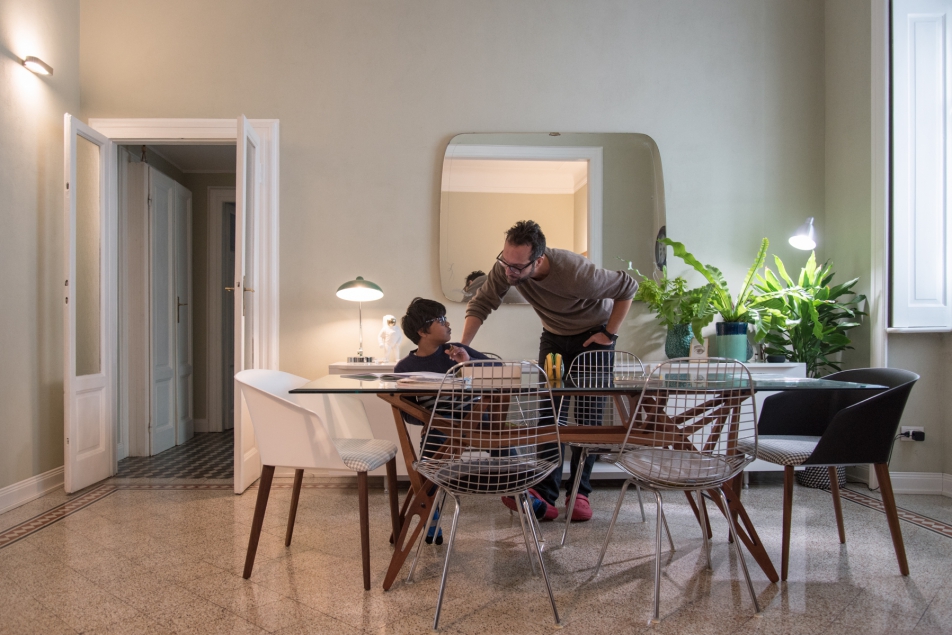
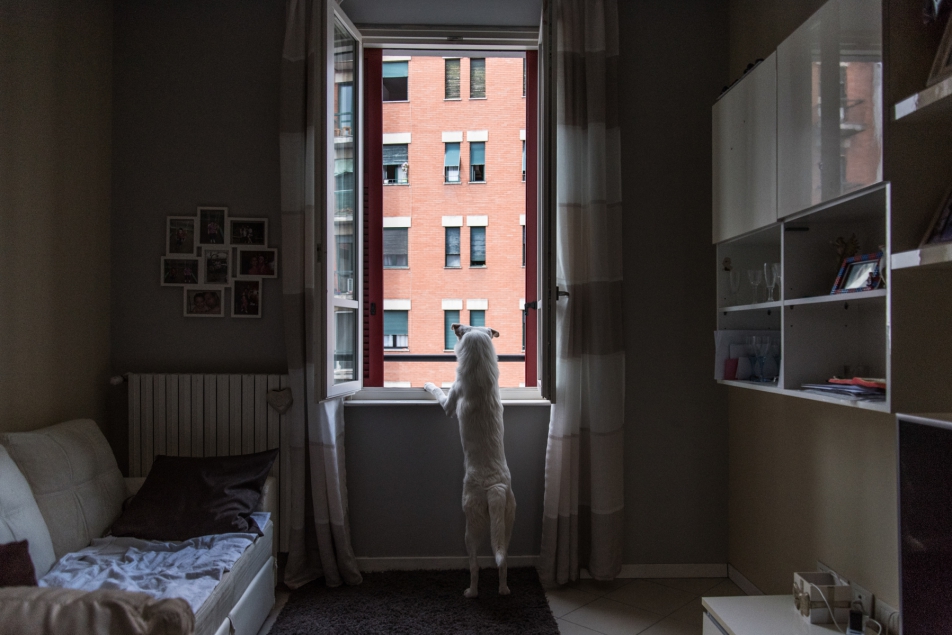
Milan. Calogero Amato, aged 56, lives with his partner, their two young daughters and their dog Chicco. They live in council housing in the Barona area and receive the Italian unemployment benefit, the citizens’ income, of 500 euros a month. Calogero used to work as an informal parking attendant near the San Siro stadium but the football championship was suspended on account of the Coronavirus emergency. Today he receives food parcels from the Caritas charity organisation.
Abdul, his wife Abideni and their children Waris and Beauty live in a small apartment in Erve in the province of Lecco, where they are helped by the Il Gabbiano association. Having left Nigeria together, they were separated in Libya: their then 5-year-old son Waris stayed with Abideni, who was pregnant with her daughter Beauty. Both adults endured dramatic experiences before reaching Italy separately and without hearing from each other for one year. They were then reunited and were beginning to rebuild their life together when the Covid-19 emergency struck, forcing them to stay at home.
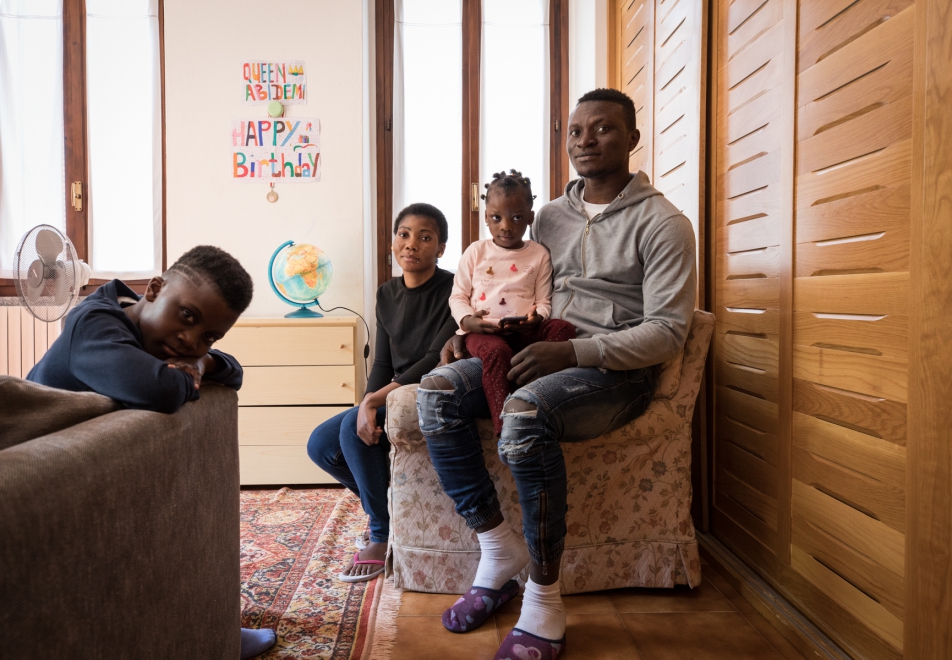
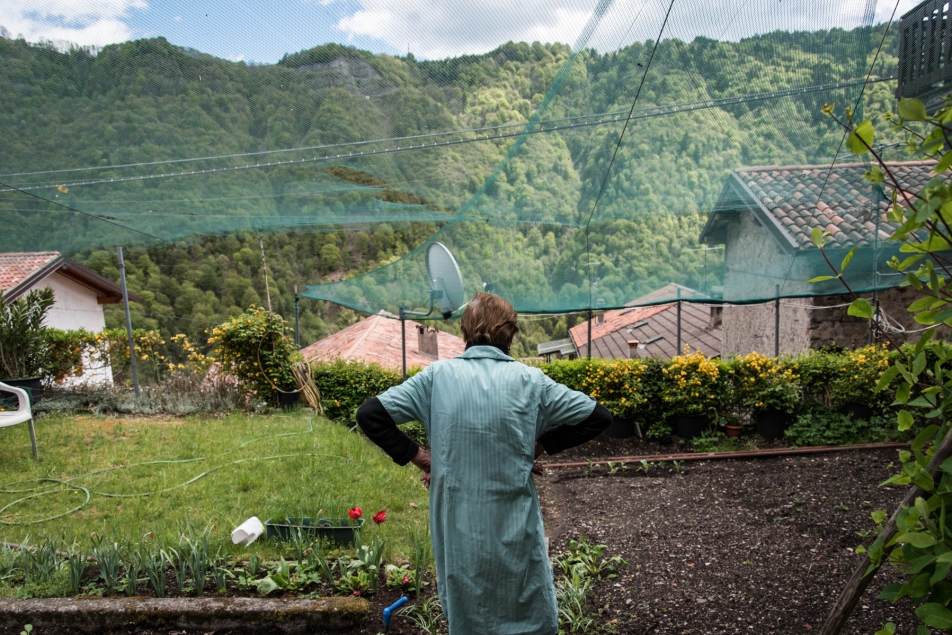
Magasa, near Brescia, is one of the so-called “zero Covid” villages, where not a single case of infection has been registered. Rosetta Gottardi, aged 92, was once a farmer. “I had a blood test for the very first time two years ago. Everything was alright”, she says.
Bollate (near Milan). Franco Iannarone, who suffers from serious respiratory failure and chronic bronchitis, has just received a tank of oxygen from Vivisol, the Sol Group company specialised in homecare health assistance.
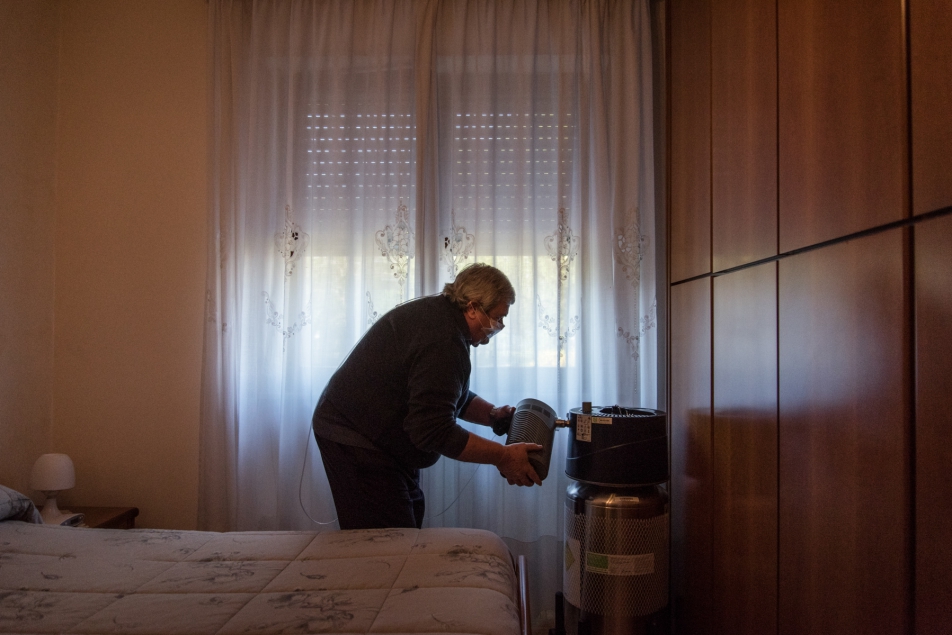
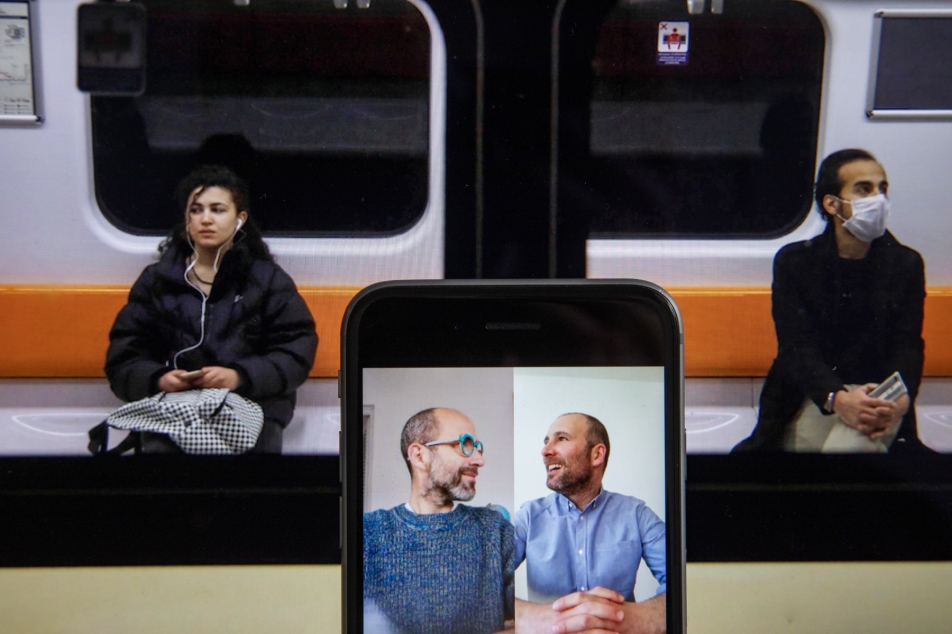
Davide lives in Madrid and produces glasses, whereas his brother Fabrizio, a video maker and film director, lives in Brussels. They often video call each other to talk about their kids. Davide and his family had planned to visit Fabrizio in Brussels after Easter. The trip has now been put on hold. They would like to meet up this summer to spend their holidays together, as they do every year. They hope to do so but realise that it might not be possible.
Montopoli di Sabina (near Rieti). Anna, who is 8, in her bedroom playing teacher with her stuffed animals. In country houses like the one where Anna has spent lockdown, distance learning was not easy because of the digital divide, a problem caused by a slow internet connection, poor computer skills or lack of computers. This problem has become particularly evident in Italy during the Covid-19 emergency.
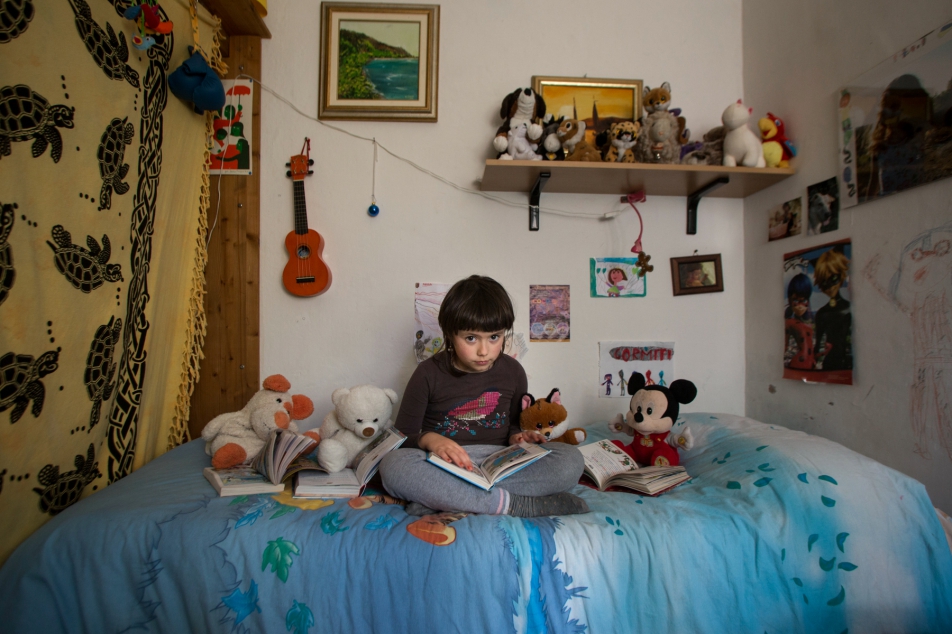
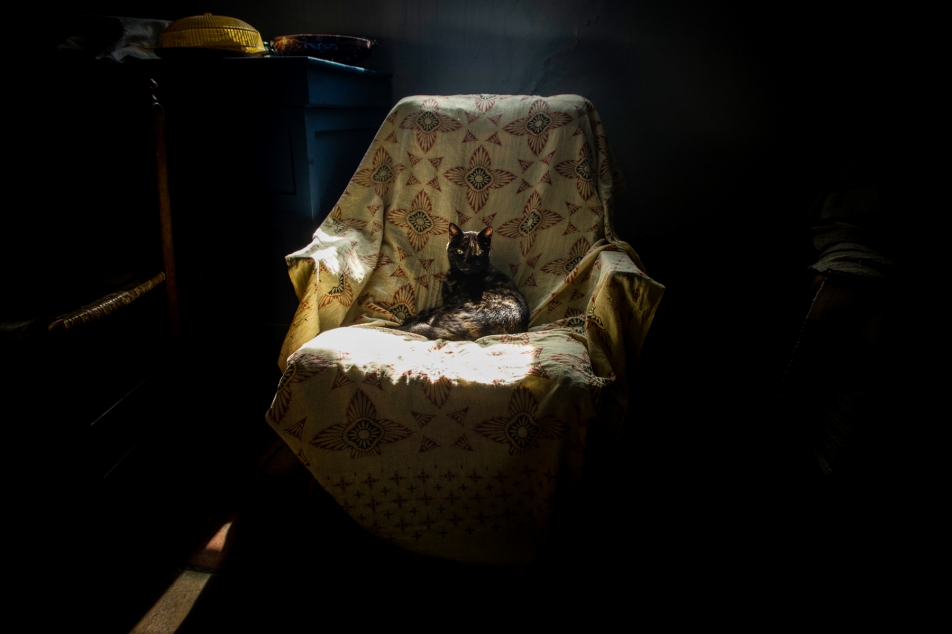
Montopoli di Sabina (near Rieti). Mousse, a cat, enjoys a long rest in the kitchen of Elisabetta, a primary school teacher who is now working from home remotely. During the lockdown period, pets have benefited from the constant presence of their human companions.
Blello, near Bergamo, is one of the so-called “zero Covid” villages, where not a single case of infection has been registered. This is the Locatelli family. From left to right: Lorenzo, Enrico, Silvia and Matteo.
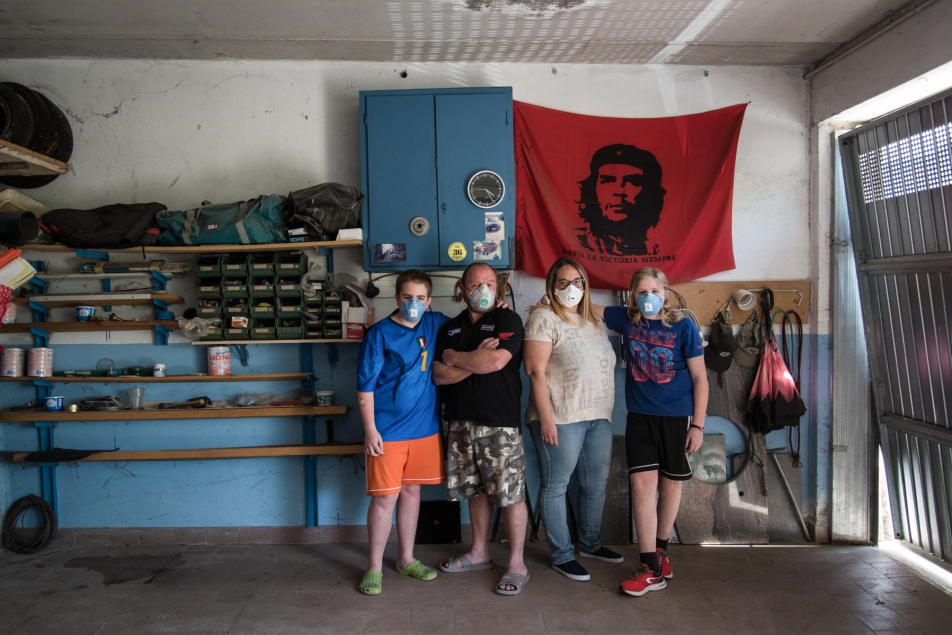
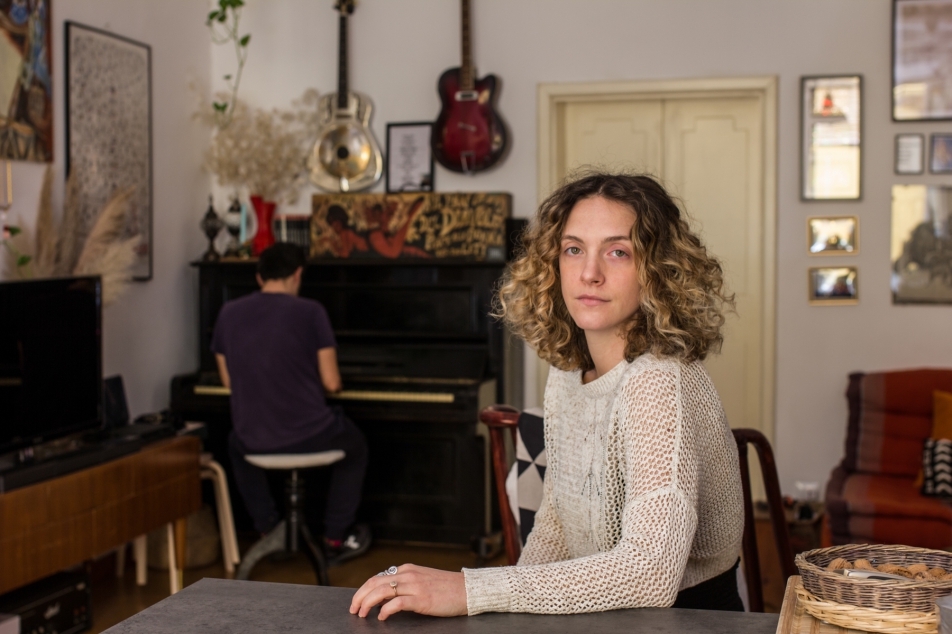
Gianluca, 35, and Irene, 31, are a musician and professor of music and an architect respectively. They had never spent as much time together as they have in this period. The isolation benefited the couple and their work: Gianluca worked on a new recording and Irene dedicated herself to new projects.
Four youngsters dancing on their terrace in Rome. They are part of a lockdown flashmob.
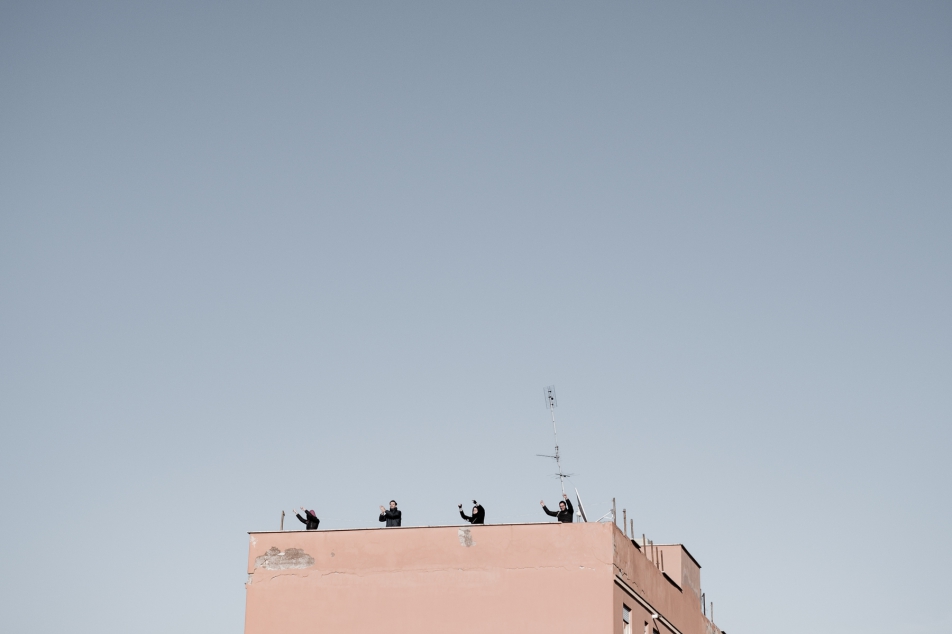
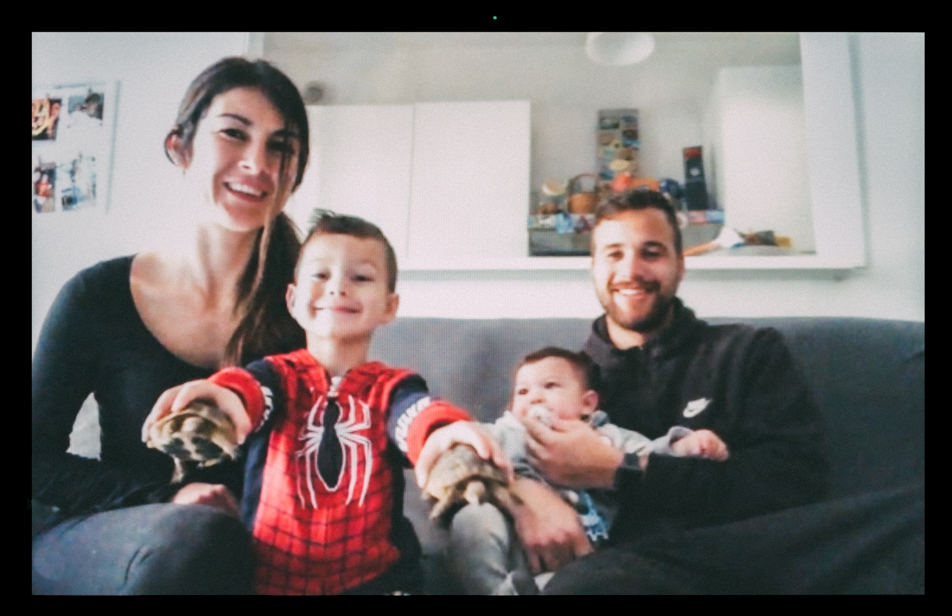
Rome. Ilenia, 33, who works for a tour operator, Daniele, 30, who works for an American multi-national corporation, and their children Diego, 4, and little Nathan, who is just nine months old. Ilenia: “I see a future where life is limited. There won't be the usual holidays and, even if they do exist, we'll have rules and restrictions. I just hope that, even if it's just between relatives, we'll be able to hug each other soon”.